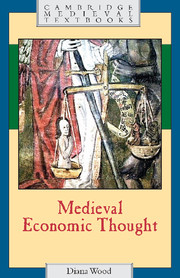Book contents
- Frontmatter
- Contents
- Preface
- List of abbreviations
- Introduction: problems, evidence, and background
- 1 Private property versus communal rights: the conflict of two laws
- 2 Wealth, beggary, and sufficiency
- 3 What is money?
- 4 Sovereign concerns: weights, measures, and coinage
- 5 The mercantile system
- 6 The just price and the just wage
- 7 The nature of usury: the usurer as winner
- 8 The theory of interest: the usurer as loser
- Conclusion
- Appendix: Notes on the main writers and anonymous works mentioned in the text
- Glossary of terms
- Select bibliography
- Index
- Cambridge Medieval Textbooks
6 - The just price and the just wage
Published online by Cambridge University Press: 05 June 2012
- Frontmatter
- Contents
- Preface
- List of abbreviations
- Introduction: problems, evidence, and background
- 1 Private property versus communal rights: the conflict of two laws
- 2 Wealth, beggary, and sufficiency
- 3 What is money?
- 4 Sovereign concerns: weights, measures, and coinage
- 5 The mercantile system
- 6 The just price and the just wage
- 7 The nature of usury: the usurer as winner
- 8 The theory of interest: the usurer as loser
- Conclusion
- Appendix: Notes on the main writers and anonymous works mentioned in the text
- Glossary of terms
- Select bibliography
- Index
- Cambridge Medieval Textbooks
Summary
INTRODUCTION
Prices and wages were closely connected and often discussed together in the medieval period. According to a thirteenth-century Roman lawyer, ‘A price is given according to the estimate of a thing, but a wage according to the estimate of the use of a thing.’ In estimating a wage, the ‘thing’ being used was labour: a wage was the price for the use of someone's labour. Yet often the labour of a craftsman or merchant was one of the factors taken into account when a price was fixed, so that, too, was to some extent a ‘wage’. In scholastic literature prices tended to overshadow wages because scholastics were not usually wage-earners. Lawyers, however, were equally concerned with both, if only because they involved the legal concept of justice.
Justice became attached to prices and wages because both were the result of a balance, supposedly a fair one, achieved between two parties, seller and buyer or employer and employee. As Aquinas appreciated:
a reward is something repaid to someone in return for work, as a sort of price paid for it. Thus just as the payment of the just price for goods received from someone is an act of justice, so too the payment of a reward for work is an act of justice.
Scholastics and lawyers built on different foundations – the former on divine law and on Aristotle's Nicomachean Ethics (v, v); the latter on certain texts of Roman law. This often led them to differing conclusions.
- Type
- Chapter
- Information
- Medieval Economic Thought , pp. 132 - 158Publisher: Cambridge University PressPrint publication year: 2002



